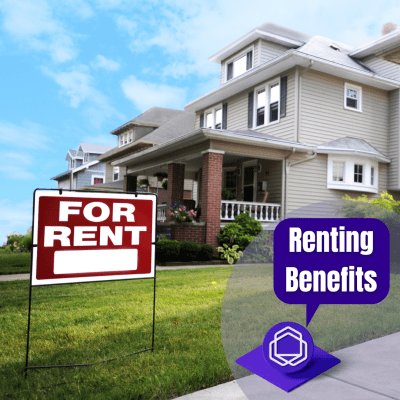Renting vs. Buying: Which is Right for You?
Renting or buying a home both have their benefits and drawbacks. In this article, we’ll dive into the pros and cons so you can decide what is right for you.
Realtyless
5 minute read

Renting vs. Buying: Which Is Right for You?
Considering whether to rent or buy? Renting or buying a home both have their benefits and drawbacks. Neither option is cut and dry a better choice. It’s important to weigh the benefits and costs to decide which option is the best for you at this time in your life. In this article, we’ll dive into the pros and cons so you can decide what is right for you.

Benefits of Renting
One of the first areas to examine when contemplating renting vs buying a home are the pros of being a renter. You might be pretty familiar with these if you’re currently renting but here are some things to consider:
Short-Term Cost:
There’s a general rule of thumb when it comes to turning over homes. If you’re planning to live in a home for less than 5-7 years, it may benefit you financially to rent. But why is that?
There are significant costs to buying and selling a home that makes the short-term gains minimal. You might be wondering how that could be when you’re building equity rather than paying rent. The short answer is the first few years of mortgage payments go almost entirely toward interest. At the 5-year point, you haven’t built enough equity in your home to cover the typical 6% real estate agent fees to sell.
Flexibility:
Hand-in-hand with short-term cost comes flexibility. It’s a no-brainer renting offers significantly more relocation flexibility than buying. No one wants to be stuck trying to sell a home when they’re ready to move on. So, if you’re a wanderer at heart, exploring different neighborhoods or home styles, trying out a new job, or just haven’t planted roots, there’s freedom in turning in your keys and walking away from a rental.
Less Responsibility:
When you own a home, you also own the responsibility of taking care of the home. Caring for a home is a little more difficult than submitting a maintenance request to your landlord when something goes wrong. Think about all those clogged sinks, leaky roofs, broken appliances, drafty windows, and other minor problems along the way. You may be spending a chunk of time watching handyman Youtube videos, calling friends/family for advice, and paying repairmen. Renting has clear benefits when it comes to the amount of time, money, and responsibility of maintenance.
Time to Save For a Down Payment or Invest in Other Opportunities:
Your rental security deposit is a lot less than a down payment. Let’s face it, a mortgage down payment is a lot of money. Renting can provide time to put away savings for a down payment. We’ve got lots of ideas on how to start saving for a down payment if that’s where you’re at. Keep in mind real estate is generally considered an investment. The money you put towards a mortgage could instead be invested in the stock market, your education, or even your roommate’s startup. It’s your choice how you want to spend your money and buying a home is just one option.
Transparent Costs:
It’s not uncommon to budget for a mortgage only to be surprised by the costs that come out of the woodwork. There can be home insurance, HOA dues, property tax, large maintenance bills, high energy costs, landscaping expenses, special assessments, and more that aren’t as predictable as rent. Your rent may go up from year to year but the consistent rent payment each month can help you budget more effectively.

Benefits of Buying
Next, let’s look at the pros of buying. You might have been subject to very thorough explanations of these points by your grandma at every holiday event but take a look at the list and decide if the benefits of buying outweigh those of renting.
Long-Term Financial Benefits:
While renting provides short-term flexibility, buying a home can provide long-term financial benefits. Homeownership builds equity over time and can result in significant financial gains if the property increases in value.
Tax Benefits:
Homeowners can benefit from tax deductions on mortgage interest payments and property taxes, which can help reduce their overall tax liability.
Stability and Control:
Homeownership provides a sense of stability and control. Landlords control leases, rules, and rent rates which can give renters limited control over their housing. Whereas, Homeowners can customize their living space, make improvements or upgrades, and have control over their homes. Several studies have shown homeownership may be associated with higher levels of self-esteem and perceived control over life.
Sense of Community:
Homeownership can provide a sense of community and belonging, as homeowners tend to be more invested in their neighborhoods and have longer-term relationships with their neighbors. Homeownership is thought to lead to higher levels of participation in local volunteering and political activities because homeowners may seek to build and protect their housing investment and community.
Conclusion
While renting can provide flexibility and affordability in the short term, buying a home can offer long-term financial and emotional benefits. Ultimately, the decision to buy a home versus renting depends on your personal and financial circumstances.
When deciding if buying or renting is the best choice for you, it can help to examine your financial situation and long-term goals. You may also want to review current mortgage rates and home values which can affect your decision.